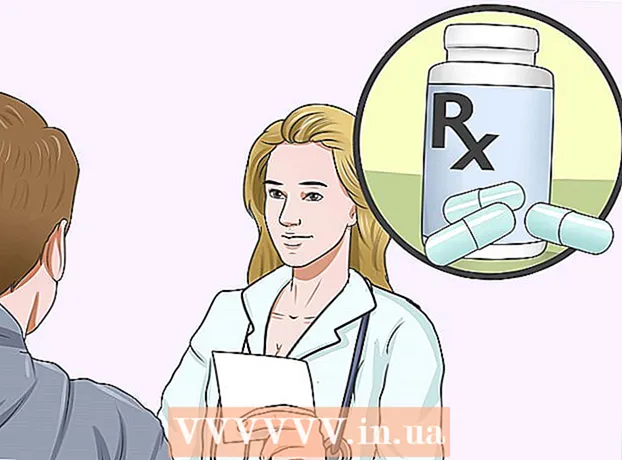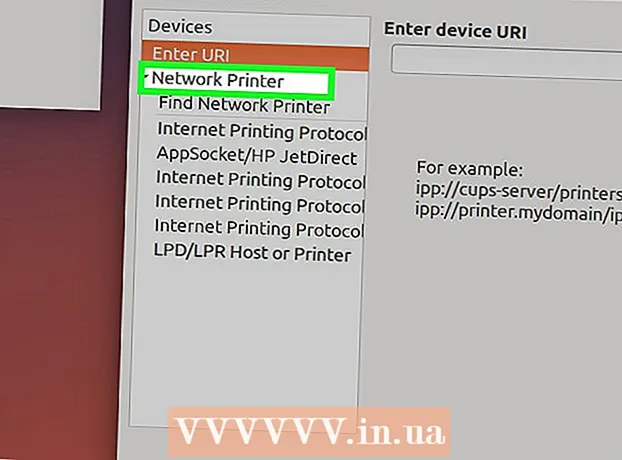
Content
- Steps
- Method 1 of 4: Symptoms
- Method 2 of 4: Testing and Treatment
- Method 3 of 4: Taking Care of Yourself
- Method 4 of 4: Prevention
Today, as the new coronavirus infection COVID-19 has spread around the world, many people are beginning to fear that their symptoms of respiratory infection may be associated with the new strain of SARS-CoV-2 coronavirus. Your symptoms are more likely to be due to a common seasonal respiratory infection, such as the common seasonal SARS or flu, but you should take them seriously and see your doctor. The doctor will assess your condition and prescribe the necessary treatment.
Attention:The information in this article is for informational purposes only and is not a substitute for consulting a doctor.
Steps
Method 1 of 4: Symptoms
 1 Pay attention to the cough (it can be dry or wet). Although coronavirus infection is a respiratory illness, its symptoms are different from those of a common seasonal cold or flu. A common symptom of the new coronavirus infection is coughing, which may be dry or produce phlegm. If you have a cough and think you may have contracted a coronavirus infection, call a doctor from the clinic or an ambulance.
1 Pay attention to the cough (it can be dry or wet). Although coronavirus infection is a respiratory illness, its symptoms are different from those of a common seasonal cold or flu. A common symptom of the new coronavirus infection is coughing, which may be dry or produce phlegm. If you have a cough and think you may have contracted a coronavirus infection, call a doctor from the clinic or an ambulance. - The likelihood that your symptoms are caused by a coronavirus infection increases if there is an outbreak of the disease in your area, you have recently been in contact with a person who has been confirmed to have a coronavirus infection, or have recently returned from another country or region with a large number of cases.
- If you have a cough, cover your mouth with a disposable tissue or at least cough up your sleeve to avoid infecting others. It is also recommended to wear a disposable medical mask - it will trap sputum drops containing the infectious agent and help protect others.
- If you are sick, do not contact people who are at risk of contracting infections and developing complications. These are people over 60, infants, children, pregnant women, and people taking immunosuppressive drugs.
 2 Measure the temperature in order to notice its rise in time. Fever is common with COVID-19. Measure the temperature with a thermometer - if it is above 38 ° C, call a doctor. When you call and describe your symptoms, be sure to say that you have a high fever. Stay home and wait for the doctor.
2 Measure the temperature in order to notice its rise in time. Fever is common with COVID-19. Measure the temperature with a thermometer - if it is above 38 ° C, call a doctor. When you call and describe your symptoms, be sure to say that you have a high fever. Stay home and wait for the doctor. - An elevated temperature in most cases is characteristic of the stage of the disease, when the infectious agent is actively released into the environment and a sick person can infect others (this is true for any infectious disease). Take care of the safety of others - stay at home.
- Keep in mind that fever is a symptom of many diseases, so don't immediately think that you have a coronavirus infection.
 3 Call an ambulance immediately if you have difficulty breathing. Shortness of breath is a serious symptom, whether it is caused by a coronavirus infection or another medical condition. Get urgent medical attention to get the treatment you need as soon as possible. Also, be sure to tell your doctor if you develop shortness of breath, which is also a common, albeit less severe symptom.
3 Call an ambulance immediately if you have difficulty breathing. Shortness of breath is a serious symptom, whether it is caused by a coronavirus infection or another medical condition. Get urgent medical attention to get the treatment you need as soon as possible. Also, be sure to tell your doctor if you develop shortness of breath, which is also a common, albeit less severe symptom. - According to the World Health Organization (WHO), the COVID-19 disease caused by the SARS-CoV-2 coronavirus is dangerous because some patients develop a serious complication - pneumonia. If you have trouble breathing, call your doctor as soon as possible.
A warning: people with weakened immune systems and chronic diseases such as cancer, heart disease and diabetes are at risk of developing severe forms of coronavirus infection. The elderly and young children are also at risk of developing complications such as bronchitis and pneumonia. If you or someone close to you is at risk, take extra care to avoid contact with infected people and animals.
 4 Look out for less common symptoms of COVID-19. While fever, cough and fatigue are the most common signs of a new coronavirus infection, some people have other symptoms as well. Sore throat, headache, loss of taste or smell, body aches, diarrhea, conjunctivitis, skin rashes, or discoloration of the skin on the fingers and toes may indicate the presence of COVID-19. Chills, runny nose, nasal congestion, and vomiting are also among its symptoms.
4 Look out for less common symptoms of COVID-19. While fever, cough and fatigue are the most common signs of a new coronavirus infection, some people have other symptoms as well. Sore throat, headache, loss of taste or smell, body aches, diarrhea, conjunctivitis, skin rashes, or discoloration of the skin on the fingers and toes may indicate the presence of COVID-19. Chills, runny nose, nasal congestion, and vomiting are also among its symptoms. - Your concern is understandable, but try not to forget that cough, fever and shortness of breath are typical symptoms of coronavirus infection. If the respiratory infection you are experiencing is accompanied by other symptoms, it is most likely caused by another pathogen.
Advice: if you are young and physically healthy, in your case, the coronavirus infection can be mild and accompanied by minor symptoms.If you have recently come from a region with a large number of COVID-19 cases, or have been in contact with a person who later was confirmed coronavirus infection, and you have any symptoms of a respiratory infection, contact the health authorities and find out if you need to get tested ... In the meantime, stay at home to avoid infecting others.
Method 2 of 4: Testing and Treatment
 1 Call your doctor if you have reason to believe you have a new coronavirus infection. If you think your symptoms are caused by COVID-19, take them seriously - severe infections can be life-threatening. Call the clinic or call an ambulance if you think you need to get tested for coronavirus infection. Tell us about the symptoms of your illness, and also if you have recently returned from another region or have come into contact with people who may have been infected with the coronavirus. Medical professionals will come to your home, take the necessary tests and give further instructions regarding treatment and quarantine compliance.
1 Call your doctor if you have reason to believe you have a new coronavirus infection. If you think your symptoms are caused by COVID-19, take them seriously - severe infections can be life-threatening. Call the clinic or call an ambulance if you think you need to get tested for coronavirus infection. Tell us about the symptoms of your illness, and also if you have recently returned from another region or have come into contact with people who may have been infected with the coronavirus. Medical professionals will come to your home, take the necessary tests and give further instructions regarding treatment and quarantine compliance. - When you call a doctor or an ambulance, be sure to inform by phone about the circumstances that give you reason to suspect you have a coronavirus infection. In this case, healthcare professionals will take special precautions to avoid spreading the virus.

World Health Organization
Global Health Agency The World Health Organization (WHO) is the United Nations specialized agency for international health. Founded in 1948, WHO monitors health risks, promotes health promotion and prevention, and coordinates international health cooperation and emergency response. WHO is currently leading and coordinating worldwide efforts to address the COVID-19 pandemic, helping countries prevent and detect disease and take action. World Health Organization
World Health Organization
Global Health AgencyOur specialist advises: for the most up-to-date information on the situation in your area, it is worth contacting your local health authority. Call ahead and find out how to act if you are sick. This will help protect you and prevent the spread of the virus and other infections.
 2 Get tested for coronavirus infection. If your doctor thinks you may have a new coronavirus infection, he or she will refer you for testing. The analysis will be taken directly at home, or you will need to come to the laboratory. To test for coronavirus infection, a swab from your nose and oropharynx will be taken.
2 Get tested for coronavirus infection. If your doctor thinks you may have a new coronavirus infection, he or she will refer you for testing. The analysis will be taken directly at home, or you will need to come to the laboratory. To test for coronavirus infection, a swab from your nose and oropharynx will be taken. - Today, tests for coronavirus are done in many laboratories, and the samples of biomaterial taken are sent for research to certified centers of hygiene and epidemiology in the constituent entities of the Russian Federation.
 3 Observe quarantine if you have symptoms of COVID-19 or test positive. If your coronavirus test is positive, you (depending on your condition) will be hospitalized or prescribed treatment at home with mandatory quarantine. If you just suspect you have a coronavirus infection or are waiting for the test results, still stay at home and observe quarantine. To date, there is no specific treatment for coronavirus. This disease is of a viral nature, therefore, antibiotic treatment is not prescribed. Your doctor will prescribe treatment and advice on how to take care of yourself and not infect others.
3 Observe quarantine if you have symptoms of COVID-19 or test positive. If your coronavirus test is positive, you (depending on your condition) will be hospitalized or prescribed treatment at home with mandatory quarantine. If you just suspect you have a coronavirus infection or are waiting for the test results, still stay at home and observe quarantine. To date, there is no specific treatment for coronavirus. This disease is of a viral nature, therefore, antibiotic treatment is not prescribed. Your doctor will prescribe treatment and advice on how to take care of yourself and not infect others. - A doctor may prescribe or recommend medications to treat symptoms. There are drugs that would destroy the virus itself, so fight its symptoms, take care of yourself and wait for the disease to pass.
- Ask your doctor about when you need to go to the clinic and what to do if your condition worsens or new symptoms develop.
 4 Call an ambulance immediately if you have severe symptoms. While some people may have a fairly easy coronavirus infection with COVID-19, others may develop severe symptoms such as shortness of breath. For these symptoms, you should always call an ambulance, even if they are not related to COVID-19. Get immediate medical attention if you or someone you care about has any of the following symptoms:
4 Call an ambulance immediately if you have severe symptoms. While some people may have a fairly easy coronavirus infection with COVID-19, others may develop severe symptoms such as shortness of breath. For these symptoms, you should always call an ambulance, even if they are not related to COVID-19. Get immediate medical attention if you or someone you care about has any of the following symptoms: - difficulty breathing or severe shortness of breath;
- bluish color of the lips or face;
- chest pain or tightness;
- increasing confusion and severe weakness.
Method 3 of 4: Taking Care of Yourself
 1 Stay home until you are fully recovered. Most patients with coronavirus infection COVID-19 are hospitalized in infectious diseases hospitals (however, this depends on the region of your residence and the number of cases in the region, For example, in Moscow, which is sadly leading in the number of COVID-19 cases, only people with severe forms of the disease are hospitalized, the rest are treated at home under the supervision of a doctor and with mandatory quarantine. go to work or school and avoid activities that require energy and energy. Try to get as much sleep as possible.
1 Stay home until you are fully recovered. Most patients with coronavirus infection COVID-19 are hospitalized in infectious diseases hospitals (however, this depends on the region of your residence and the number of cases in the region, For example, in Moscow, which is sadly leading in the number of COVID-19 cases, only people with severe forms of the disease are hospitalized, the rest are treated at home under the supervision of a doctor and with mandatory quarantine. go to work or school and avoid activities that require energy and energy. Try to get as much sleep as possible. - Ask your doctor when you can return to normal life without fear of infecting others. The period during which a person can serve as a source of infection after the disappearance of symptoms can last up to 14 days or even longer.
Advice: if you do not live alone, try to provide yourself with maximum isolation in a separate room. If you have multiple bathrooms in your home, use a separate bathroom. This will help keep your family members or flatmates from getting the virus.
 2 Take over-the-counter pain relievers and antipyretic drugs. Respiratory infections are often accompanied by fever and body aches. To relieve these symptoms, take over-the-counter medications such as ibuprofen (Nurofen), naproxen (Nalgezin), or paracetamol (Efferalgan). If you are over 18 years old, you can take aspirin (acetylsalicylic acid) to help relieve pain and fever.
2 Take over-the-counter pain relievers and antipyretic drugs. Respiratory infections are often accompanied by fever and body aches. To relieve these symptoms, take over-the-counter medications such as ibuprofen (Nurofen), naproxen (Nalgezin), or paracetamol (Efferalgan). If you are over 18 years old, you can take aspirin (acetylsalicylic acid) to help relieve pain and fever. - Never give aspirin to children or adolescents under the age of 18. This drug can cause them a potentially fatal condition called Reye's syndrome.
- Always follow the directions for the medicine or your doctor's recommendations when determining the dosage of the medicine. If you are pregnant or breastfeeding, be sure to check with your doctor before taking any medicine.
Advice: You may have heard news reports that nonsteroidal anti-inflammatory drugs such as ibuprofen (Nurofen) and naproxen (Nalzegin) worsen the condition of a COVID-19 patient. It is worth noting that no convincing evidence of this has been obtained. If you are in doubt about whether to take a particular drug, consult your doctor.
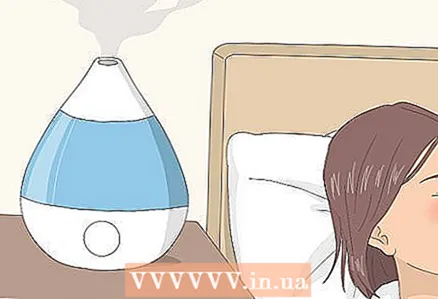 3 Use a humidifier to relieve coughing. A humidifier can help relieve throat irritation and keep the lungs and nasal passages moisturized, thus relieving coughs. In addition, moist air helps to thin the phlegm, which makes coughing more productive. Place a humidifier near your bed and turn it on at night, or leave it on in the room where you are during the day.
3 Use a humidifier to relieve coughing. A humidifier can help relieve throat irritation and keep the lungs and nasal passages moisturized, thus relieving coughs. In addition, moist air helps to thin the phlegm, which makes coughing more productive. Place a humidifier near your bed and turn it on at night, or leave it on in the room where you are during the day. - Take a hot shower, or just turn on hot water and sit in the bathtub - hot steam will help relieve symptoms and help thin phlegm in your lungs and sinuses.
 4 Drink plenty of fluids. Respiratory diseases are often accompanied by a violation of the body's water balance. If you are sick, drink plenty of fluids: you can drink water, juice, and other liquid foods. This will help maintain water balance and reduce airway congestion.
4 Drink plenty of fluids. Respiratory diseases are often accompanied by a violation of the body's water balance. If you are sick, drink plenty of fluids: you can drink water, juice, and other liquid foods. This will help maintain water balance and reduce airway congestion. - If you have a cough and sore throat, a warm, heavy drink is recommended to relieve symptoms: drink warm broth, tea, and warm water with lemon juice.
 5 Self-isolate at home until a doctor confirms that you are healthy. It is extremely important to stay at home until you are fully recovered so that you do not infect anyone. Your doctor will tell you when you can go back to normal. Until you are discharged, do not go anywhere, even if you feel better.
5 Self-isolate at home until a doctor confirms that you are healthy. It is extremely important to stay at home until you are fully recovered so that you do not infect anyone. Your doctor will tell you when you can go back to normal. Until you are discharged, do not go anywhere, even if you feel better. - The patient is discharged only after receiving a two-fold negative laboratory test result, carried out at an interval of at least 1 day.
- If a patient is admitted to a special ward, he will also remain in quarantine until he fully recovers: the symptoms disappear and the test results are negative.
Method 4 of 4: Prevention
- 1 Get vaccinated. If possible, get vaccinated. Three vaccines for the prevention of coronavirus infection have been registered in the Russian Federation. Find out at the clinic or on the website of your local health department if vaccinations are ongoing in your community and make an appointment. If you are at risk due to your profession or health condition, it is best not to postpone this step.
- All three registered vaccines - Gam-COVID-Vac (Sputnik V), Kovivac and EpiVacCorona - were developed in Russia. Other countries use vaccines developed by Pfizer-BioNTech, Moderna and Johnson & Johnson.
- The most widely used vaccine is Gam-COVID-Vac. Most likely, there will only be one vaccine available at the medical facility, but if you wish, you can inquire about what vaccines are used in your city and whether there is a choice. All of them are given in two doses with an interval of 14-21 days, depending on the specific vaccine, and significantly reduce the risk of severe illness or hospitalization.
 2 Spend as much time at home as possible to reduce your interactions with other people. You've probably already heard about a new concept, the so-called "social distancing", which is aimed at reducing contact with others. Compliance with these principles will help prevent the spread of the virus in the community. Only leave the house when necessary (for example, you need to buy groceries or go to work). If possible, arrange for you to work remotely or study remotely.
2 Spend as much time at home as possible to reduce your interactions with other people. You've probably already heard about a new concept, the so-called "social distancing", which is aimed at reducing contact with others. Compliance with these principles will help prevent the spread of the virus in the community. Only leave the house when necessary (for example, you need to buy groceries or go to work). If possible, arrange for you to work remotely or study remotely. - If you want to chat with friends or family members, do not gather more than ten people and try to be at a distance of 1.5-2 meters from each other.
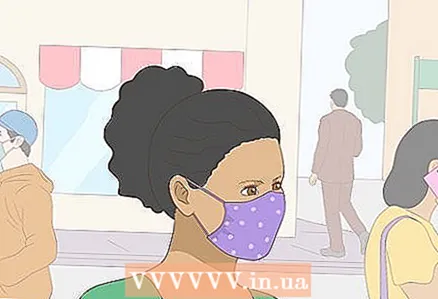 3 In public places, wear a mask and do not come closer than 1.5–2 meters to people. If you need to go grocery shopping or leave home for any other reason, take steps to protect yourself and those around you. Wear a tight-fitting mask that covers your nose, mouth, and chin. Also, do your best to be at least 1.5 meters away from everyone except those who live in the same apartment with you.
3 In public places, wear a mask and do not come closer than 1.5–2 meters to people. If you need to go grocery shopping or leave home for any other reason, take steps to protect yourself and those around you. Wear a tight-fitting mask that covers your nose, mouth, and chin. Also, do your best to be at least 1.5 meters away from everyone except those who live in the same apartment with you.  4 Wash your hands regularly water and soap. Regular hand washing is the most effective way to help prevent the spread of coronavirus and other pathogens. Try to wash your hands with soap and water as often as possible throughout the day. Be sure to wash your hands if you touch surfaces that many people touch (for example, a doorknob in a public toilet or handrails in public transport),and also after contact with people or animals that may be a source of infection. Wash your hands for at least 20 seconds, rinsing thoroughly between your fingers.
4 Wash your hands regularly water and soap. Regular hand washing is the most effective way to help prevent the spread of coronavirus and other pathogens. Try to wash your hands with soap and water as often as possible throughout the day. Be sure to wash your hands if you touch surfaces that many people touch (for example, a doorknob in a public toilet or handrails in public transport),and also after contact with people or animals that may be a source of infection. Wash your hands for at least 20 seconds, rinsing thoroughly between your fingers. - To time the time it takes to wash your hands thoroughly, sing “Happy Birthday to You,” or just slowly count to 20.
- When you can't wash your hands, use sanitizer or alcohol wipes.
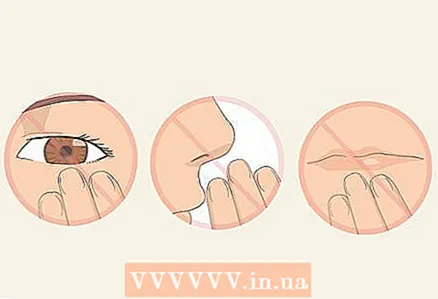 5 Avoid touching your eyes, nose, and mouth. Respiratory viruses, including coronaviruses, enter the human body through the mucous membranes of the eyes, nose and mouth. To protect yourself from the virus, try not to touch your face with your hands, especially if you haven't washed them for a long time.
5 Avoid touching your eyes, nose, and mouth. Respiratory viruses, including coronaviruses, enter the human body through the mucous membranes of the eyes, nose and mouth. To protect yourself from the virus, try not to touch your face with your hands, especially if you haven't washed them for a long time.  6 Wash and disinfect all objects and surfaces, both at home and in public places. To prevent the spread of infection (not only coronavirus, but many other diseases), disinfect frequently touched surfaces daily. To prepare a disinfectant solution, dissolve 250 ml of liquid chlorine bleach (such as Whiteness) in 4 liters of warm water and wipe the surface. If you have a chlorine gel on hand, look on the package for instructions on how to prepare the surface treatment solution. For example, you can dissolve 60 ml of Comet Universal Gel in 5 liters of water and treat the surfaces with this solution. You can also use special alcohol wipes or sprays. Ensure that surfaces remain damp for at least 10 minutes to ensure proper disinfection.
6 Wash and disinfect all objects and surfaces, both at home and in public places. To prevent the spread of infection (not only coronavirus, but many other diseases), disinfect frequently touched surfaces daily. To prepare a disinfectant solution, dissolve 250 ml of liquid chlorine bleach (such as Whiteness) in 4 liters of warm water and wipe the surface. If you have a chlorine gel on hand, look on the package for instructions on how to prepare the surface treatment solution. For example, you can dissolve 60 ml of Comet Universal Gel in 5 liters of water and treat the surfaces with this solution. You can also use special alcohol wipes or sprays. Ensure that surfaces remain damp for at least 10 minutes to ensure proper disinfection. - If someone in your home is sick, immediately wash the dishes and utensils used by the sick person with hot water and detergent. Also, wash the bed linen used by the patient in hot water.
 7 Stay away from people who are sick or looking sick. The coronavirus is spread by droplets of sputum secreted by an infected person. If a sick person coughs, droplets of phlegm are released into the air, and healthy people nearby can inhale them. If you see that a person is coughing, or he complains to you that he is sick, calmly and politely move away from him. In addition, try to avoid the following routes of transmission of the virus:
7 Stay away from people who are sick or looking sick. The coronavirus is spread by droplets of sputum secreted by an infected person. If a sick person coughs, droplets of phlegm are released into the air, and healthy people nearby can inhale them. If you see that a person is coughing, or he complains to you that he is sick, calmly and politely move away from him. In addition, try to avoid the following routes of transmission of the virus: - through close contact with an infected person: hugging, kissing, shaking hands, as well as being near a sick person for a long time (for example, on a bus or on an airplane);
- through common dishes, cutlery or personal belongings of a sick person;
- if you touch your eyes, nose, or mouth after touching an infected person;
- when you touch the feces of an infected person (for example, when changing a diaper to a sick child).
 8 Cover your mouth when coughing or sneezing. When a sick person coughs and sneezes, the coronavirus is released into the environment and can infect others. If you have a coronavirus infection and are coughing or sneezing, cover your mouth and nose with a tissue, tissue, or medical mask.
8 Cover your mouth when coughing or sneezing. When a sick person coughs and sneezes, the coronavirus is released into the environment and can infect others. If you have a coronavirus infection and are coughing or sneezing, cover your mouth and nose with a tissue, tissue, or medical mask. - Using a tissue or tissue, throw it in the trash right away, and then wash your hands with warm water and soap.
- If you start coughing or sneezing unexpectedly, or if you don't have a paper napkin on hand, cover your mouth and nose with the fold of your elbow rather than your hand. In this case, the virus will not get from your hands to the surfaces that you touch.
 9 Take good care of hygiene if you come into contact with animals. Despite the fact that today there is no scientific evidence that a person can become infected with coronavirus from animals, such a possibility is not excluded. In addition, several cases have been recorded when pets became infected with COVID-19 infection from their owners. If you have come into contact with any animals, both wild and domestic, wash your hands thoroughly with soap and water.
9 Take good care of hygiene if you come into contact with animals. Despite the fact that today there is no scientific evidence that a person can become infected with coronavirus from animals, such a possibility is not excluded. In addition, several cases have been recorded when pets became infected with COVID-19 infection from their owners. If you have come into contact with any animals, both wild and domestic, wash your hands thoroughly with soap and water. - Be especially careful to avoid contact with any animal that looks sick.
 10 Thoroughly cook meat and other animal products. A person can contract coronavirus infection and many other diseases by eating meat and milk that have not been properly processed. Do not eat raw or unpasteurized animal products. Also, wash your hands thoroughly and clean surfaces and utensils that have come into contact with raw meat or unpasteurized milk.
10 Thoroughly cook meat and other animal products. A person can contract coronavirus infection and many other diseases by eating meat and milk that have not been properly processed. Do not eat raw or unpasteurized animal products. Also, wash your hands thoroughly and clean surfaces and utensils that have come into contact with raw meat or unpasteurized milk.  11 Pay attention to the recommendations for travelers if you are planning a trip to another country or another region of Russia. Due to the global pandemic, many countries have closed borders or introduced special requirements and quarantine measures for visitors. Check the websites of the US Centers for Disease Control and Prevention and the World Health Organization for the latest information. These sites provide information on how to protect yourself from infection while traveling. When traveling in Russia, always find out in advance what rules for visitors are in effect at the moment in a particular region.
11 Pay attention to the recommendations for travelers if you are planning a trip to another country or another region of Russia. Due to the global pandemic, many countries have closed borders or introduced special requirements and quarantine measures for visitors. Check the websites of the US Centers for Disease Control and Prevention and the World Health Organization for the latest information. These sites provide information on how to protect yourself from infection while traveling. When traveling in Russia, always find out in advance what rules for visitors are in effect at the moment in a particular region.

